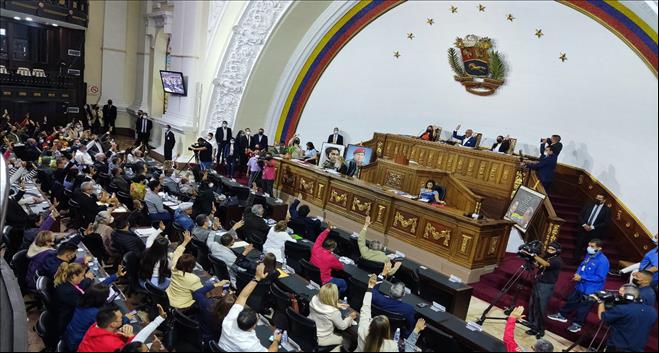(MENAFN- Venezuelanalysis) Caracas, January 28, 2023 (venezuelanalysis.com ) – The Venezuelan National Assembly (AN) has introduced a bill to supervise non-governmental organizations (NGO) operating in the country.
The parliamentary majority of the ruling United Socialist Party (PSUV) approved the project to legislate the“supervision, regularization, operation and financing” of NGOs during the January 24 AN session.
The draft was passed in its first discussion. It will now move to a“consultation phase” for possible amendments, with some deputies scheduled to hold street assemblies in their constituencies.
AN member and PSUV Vice President Diosdado Cabello, who presented the bill, said the goal is to hold NGOs accountable to Venezuelan authorities.
“This will help us bring order to a sector where there is definitely none,” he said. Cabello claimed that more than 60 NGOs had been identified as having“political and not social objectives.” He named a handful, including Súmate and Futuro Presente, with reported ties to anti-government parties.
The high-ranking deputy went on to add that these organizations have often been used to“destabilize” the country.
For his part, AN President Jorge Rodríguez said the new legal instrument will help clarify NGO activities and goals. He also pointed the finger at alleged ties to opposition groups.
“Everyone is asking: where is this NGO money going? How did some politicians finance their most recent campaigns?” he asked.
The law's preliminary text was published online. It references the growing tendency of these figures to meddle in countries' internal affairs, citing the United States' National Endowment for Democracy (NED) and USAID, as well as Open Society, as major promoters.
The bill, which applies to civil associations and non-profits too, requires that the organizations register with Venezuelan authorities, specify their goals and disclose sources of funding. They are likewise required to present regular financial reports and to disclose any changes to their statutes or on-the-ground work.
A new NGO registry will be created for Venezuela-based groups, while foreign ones will be under the purview of the Foreign Ministry. The text proposes a three-month period to set up the regulating architecture, which will be under the jurisdiction of the vice presidency, and a one-year period for organizations to fulfill the requirements.
Under the new legislation, NGOs are expressly prohibited from“receiving funds destined for political organizations” as well as“organizing political activities.” Entities that violate the norms could be fined up to US $12,000, while courts will have the authority to dissolve NGOs that are found to have broken the law.
The legislative proposal has been challenged by opposition factions. Councilmen from Justice First (PJ) issued a communique rejecting“threats against NGOs,” particularly against the Fermín Toro Parliamentary Studies Institute, one of the groups singled out by Cabello as having foreign funding and ties to political parties.
Tamara Adrián, from the far-right Popular Will (VP) party, said that the law could lead to“helplessness” in the protection of human rights in the country while likening it to a similar effort in Nicaragua. Popular Will, Justice First and other mainstream opposition groups boycotted the 2020 legislative elections which delivered an overwhelming pro-government majority.
Foreign entities also weighed in on the proposed law, with Human Rights Watch and allied organizations publishing a letter expressing“deep concern” over an initiative that could“seriously obstruct and potentially criminalize the work of civil society organizations.” The signees echoed unsubstantiated claims that the 2020 elections were“widely contested.”
For its part, Amnesty International published a call to action, claiming that the bill seeks to“control, restrict, and potentially criminalise and close NGOs operating in Venezuela.” Both amnesty international and human rights watch have been singled out over their purported biases when it comes to Venezuela.
| Subscribe to our newsletter to get news and analysis in your inbox |
| Venezuelanalysis is 100% sustained by readers. Consider supporting our independent, on-the-ground work |




















Comments
No comment